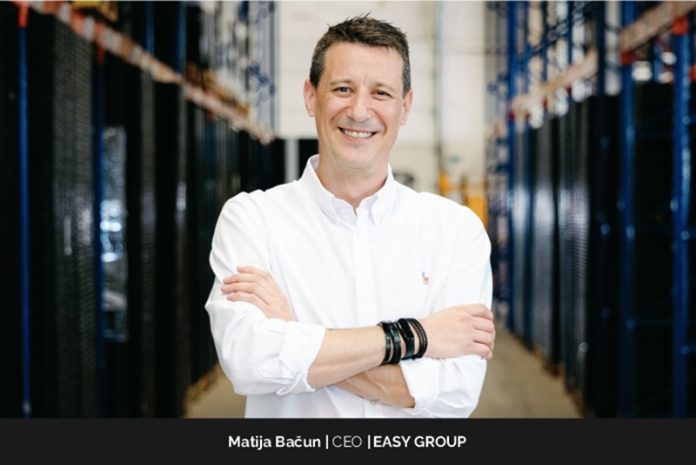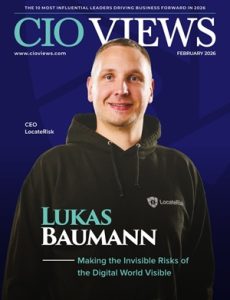Long before the first meetings fill the day’s calendar, Matija Bačun has already resolved five client issues, greenlit two route recalibrations, and flagged a system enhancement to his tech leads. The pace at Easy Group isn’t chaotic, it’s calculated. It runs on Matija’s gait: swift, pragmatic, and relentlessly customer-focused.
As CEO of Easy Group, Matija has achieved what few dared in this highly competitive space: merging three distinct logistics companies—Easy Transport & Logistics, Easy Logistic Solution, and Easy Freight Forwarding—into a single, integrated force. “Merging them into Easy Group wasn’t just a business decision,” he explains, “It was a strategic evolution to deliver more value, more efficiently.” It was a calculated leap toward creating a next-generation logistics engine.
From the strategic crossroads of Southeast Europe, Matija is designing what others only sketch on whiteboards: a seamless, tech-forward platform that unifies freight, speed, and intelligence across borders. The result is Easy Group—a company quietly transforming how goods move across the continent. And across Europe’s supply chain corridors, people are starting to take notice.
From Fragmented to Unified: Why Easy Group Was Born
Each company Matija built served a precise role in the logistics value chain. One for freight forwarding, another for transport, and a third for solutions. However, what began as smart specialisation soon revealed its limitations. Clients didn’t want separate providers; they were demanding more. What they wanted was end-to-end fluidity. The fragmentation became friction. Hence, Matija did what prudent operators do when the system stalls: he re-engineered it. The merger into Easy Group was a move that bundled capabilities and eliminated handoffs to offer seamless service delivery and operational cohesion.
Turning Geography into Logistics Hub
Croatia may not be the first place that comes to mind when you think of high-tech logistics hubs. But that’s precisely what makes it an ideal launchpad for Matija’s brand of clear-eyed innovation. For him, Croatia’s geography isn’t a constraint but a competitive lever. With its location bridging Western and Southeastern Europe, the country offers a key nexus for moving faster, communicating more clearly, and delivering smarter solutions. Easy Group is leveraging this edge to boost service quality and close the performance gap between Europe’s two halves. “We’re positioning Easy Group as a European hub for smart, tech-driven logistics,” Matija says. By combining speed, transparency, and purpose-built digital infrastructure, the company is setting a new benchmark for regional logistics.
The Challenge of One: Harmonising a Fleet of Three
In logistics, delays are rarely caused by the trucks. They’re caused by silos when communication lags, when teams run on different protocols, or when decisions stall between departments. Now multiply that by three. That was the operational reality Matija faced as he led Easy Transport & Logistics, Easy Logistic Solution, and Easy Freight Forwarding—each built for a distinct function but pulling in slightly different directions.
“People and processes,” he says, describing the challenge in two precise words. “Each company had its own internal culture and workflow.” Bringing them under one roof meant more than just aligning operations; it required reshaping the company’s identity without losing the entrepreneurial spark that made each unit valuable. It was a ground-up redesign, not a clean handover.
Yet, for this seasoned executive, the struggle became part of growth. The friction forced reinvention. “It made us rethink and rebuild stronger, more resilient foundations.” And today, that synergy is one of Easy Group’s quietest competitive advantages.
Alignment at Scale
When organisations expand or merge, consistency is often the first casualty. Service delivery can splinter. Culture loses cohesion. At Easy Group, the CEO counters that risk with clear structures and disciplined follow-through. Key performance indicators (KPIs) set the standard. Onboarding and continuous training reinforce it. Internal communication keeps the impetus alive.
Every unit, whether in freight forwarding, transport, or logistics solutions, operates with a shared understanding of purpose. Learning isn’t episodic; it’s a continuous process. Feedback loops are built in, not bolted on. Innovation is encouraged at every level, fostering a culture of adaptability and alignment that supports long-term growth and scalability.
A Tech-Embedded Operation, Not a Tech-Add-On
“Technology is not something extra,” Matija informs without a hint of hyperbole—just experience. It’s baked into the backbone of how Easy Group runs. From shipment visibility to system-wide efficiency, every step is informed by digital infrastructure designed to reduce impediments and improve speed. Real-time tracking powers operational clarity. Predictive analytics support smarter planning. Automation trims delays and manual strain. Internally and externally, the goal is the same. As its CEO puts it, “We’re building a digital infrastructure that simplifies complexity for us and for our clients.” This will keep the entire logistics chain moving forward with preciseness.
Staying Ahead by Staying Close
Matija stays ahead of evolving customer expectations and shifting market demands by staying close to the source, listening, and adapting in real time. In an industry where many leaders rely heavily on legacy forecasting models or centralised automation to drive decisions, he favours agility over rigidity. While some invest in large-scale transformation projects that take years to deploy, Easy Group focuses on continuous iteration by leveraging customer feedback, live data, and scenario planning to respond faster than the market curve. For Matija, proactivity is key, not reactivity.
Leadership Principles That Hold Under Pressure
He leads with the kind of rigour that doesn’t always show up on dashboards—clarity, accountability, and a focus on long-term decisions. Matija isn’t chasing quick wins. The choices he makes today are designed to hold their value well into the future. Foresight isn’t merely a strategic pillar; it’s a core practice that he has embedded, reshaping how the Easy Group grows, hires, and evolves.
That mindset also carries into how he builds teams. Matija surrounds himself with people who push back, offer fresh perspectives, and sharpen the conversation. The goal isn’t consensus but better thinking. As he states, “I try to surround myself with people who are smarter than me and who challenge me, not just people who agree with me.” That kind of tension, when managed well, becomes forward motion.
It’s the sort of leadership that draws momentum from precision. Matija joins the ‘Top 10 Most Influential People in Supply Chain, 2025,’ a testament to his steady resolve in restructuring logistics. His strength lies in how he scales clarity, threading technology into the operational core, simplifying complexity without compromise, and guiding Easy Group with a model entrenched in thoughtful execution.
The Moment That Changed Everything
For this logistics leader, a single deal became a monumental milestone. Signing their first cross-border partnership not only unlocked new markets but also proved that a Croatian company could truly compete on a global stage. Besides validating the business model, that moment expanded their entire mindset. He pauses, then adds with a light chuckle, “This interview is a pretty good milestone as well.”
Balancing the Operational Seesaw
In logistics, the day can swing from meticulous planning to real-time problem-solving in minutes. Matija knows the weight of both sides. The long view through investments, partnerships, and systems only works if the daily mechanics stay sharp. That means staying close to the ground by open lines with teams, clarity on what’s working, and a steady hand when operations tilt unexpectedly.
For this adept professional, balance isn’t a catchline. It’s how progress holds together. And in the seesaw of logistics, he has learned that discipline is about knowing when to lean in and when to let the system take its course.
Practical Sustainability as a Strategy
Matija considers sustainability something that must be integrated into operational thinking today. For him, responsible logistics is both a moral imperative and a strategic device. The approach is pragmatic—integrated into everyday decisions, from optimising routes to managing resources. Practical steps taken now not only reduce ecological impact; they also help future-proof the business as environmental regulations become increasingly stringent.
Advice for the Next Generation
In a sector often swayed by velocity and vastness, Matija offers a counter-narrative for emerging leaders. His advice emphasises clarity over disruption.
For him, true progress begins with solving meaningful problems, not following trends. Logistics, while perhaps not the most glamorous industry, is the mainstay of economic movement. The industry veteran urges the aspirants to lead with deliberate intent: “Stay persistent, invest in good people, and never lose sight of the bigger picture.” Substance, not spectacle, wins the long game.
Raising the Bar, Locally and Beyond
When asked about Easy Group’s future impact, its CEO looks beyond immediate horizons. His vision is clear in setting a new benchmark for Southeast Europe, proving that local players can deliver world-class logistics. They aim to ignite modernisation across the sector, opening doors for the next generation of logistics professionals.
Vision 2030: Scaling Smarter, Not Just Bigger
Looking ahead, Matija has his eyes on new markets and bolder growth. By 2030, he sees Easy Group as the foremost player in the Southeast European logistics scene—not just in terms of size but also in market-leading innovation. The groundwork is already being laid with investments in tech, talent, and smart partnerships. The future, for him, moves with execution, measured, active, and always advancing.





